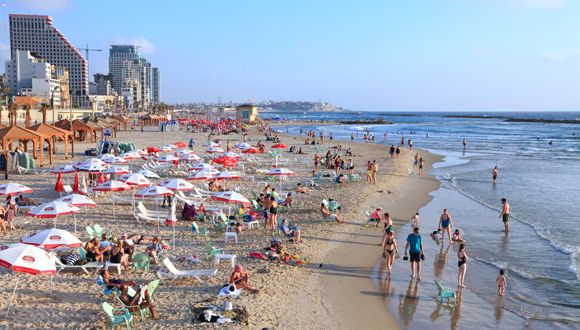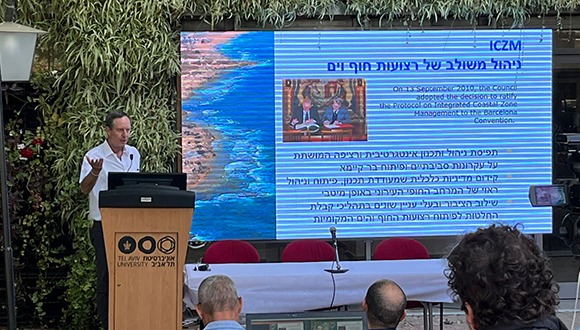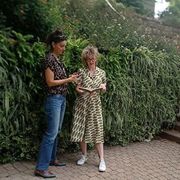Who's Protecting Israel's Beaches?
And what were they all doing in the beautiful Matanel Garden on TAU Campus?
Summer is finally here, and now that travelling has resumed, Tel Avivians and tourists alike are grabbing their towels and flip-flops and heading to Tel Aviv's amazing beaches. Accessible and fun for everyone, the Tel Aviv beaches attract families and singles, rich and poor, young and old. Parents enjoy watching their children build sand castles, while older kids swim, surf and flirt. There is a dedicated religious beach, a gay beach catering to the LGBTQ community, a special dog beach for our four-legged friends, a boardwalk with its many cafes and restaurant. Fun and inclusive, the beaches is an integral part of Tel Aviv, a part of the city's DNA.
There is, however, a black and looming cloud in the otherwise clear blue sky. Pollution, is a well-known and serious problem for Israel’s 195 km long coastline.
We have good news, though: there are people who are working to protect our beaches, and they're a force to be reckoned with.
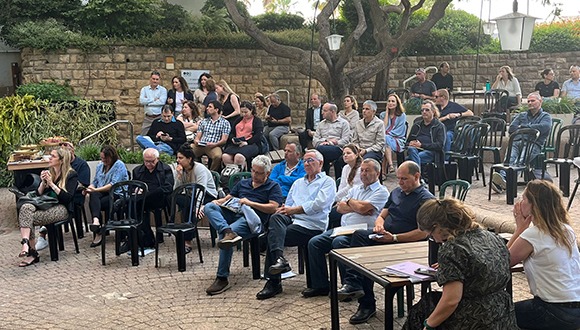
The protectors of Israel’s coastlines all gathered in the beautiful Matanel Garden of TAU's Social Sciences building
Addressing the Challenges of Coastal Conservation
Recently, the Institute for Local Government and the Gershon H. Gordon Faculty of Social Sciences hosted an inauguration event for a Steering Committee tasked with innovative coastal planning and management according to the Integrated Coastal Zone Management, ICZM. The Integrated Coastal Zone Management approach, defined by The European Commission as “a dynamic, multidisciplinary and iterative process to promote sustainable management of coastal zones,” is applied worldwide to offer effective and sustainable responses to challenges facing coastal authorities, including: infrastructures that require coastal and marine resources; increasing density; a fragile ecosystem; multiple stakeholders and authorities; accelerated development; conflicts of interest and climate change. All of which characterizes the situation in the Israeli coastal strip.
The mission of this Steering Committee, therefore, is to create a significant platform for recognizing and implementing the ICZM principles in Israel. The Coastal Authorities Forum and Adam Teva V’Din (‘People, Nature and Law’) initiated the preparation of a framework of principles for the management and planning of Israel's beaches in the spirit of international principles.
Educating Municipalities
The event marked the end of a three-year long process of setting up an educational program for the coastal municipalities, together with environmentalists, ranging from mayors and government officials to coastal authorities and environmental organizations, stakeholders and various experts, all of whom were present at the gathering on Tel Aviv University campus.
"There's a need to educate the different players," explains Ophir Pines-Paz, Head of TAU's Institute for Local Government, "namely the municipalities and Israel's planning authorities, all of whom have been involved in this process - on the appropriate implementation of the ICZM principles, from an environmental, social and economic perspective."
Mainly, the event officially kicked off a series of 22 tailor-made workshops that will educate the same number of coastal municipalities on the elements involved in the process of implementing the ICZM principles in their cities, tackling the planning and management aspects involved. The workshop series is expected to stretch over a year.
Looking for Solutions
According to Pines-Paz, "Some issues that require immediate attention on Israel's coastline include: making sure the environment is factored in for building projects on and by beaches; deciding where fishing ought to be prohibited and how to implement this; what type of scientific experiments should be allowed and which ought to be prohibited in order not to hurt the environment, as well as ensuring accessibility for various handicaps." He adds that it was only 3-4 years ago, that municipalities became responsible for the first 400 meters into the water, which means that many issues are quite new to them.
The process thus far has already led to some great solutions. The municipalities of Rishon LeZion and Bat-Yam have for instance embarked on an inter-city project and are co-managing a shared sports beach where the two cities intersect.
Ophir Pines-Paz
Strong Support
Pines-Paz added: “We are grateful to the Matanel Foundation for supporting the Coastal Authorities Forum from the outset and for contributing to the garden we are now gathered in. Today’s meeting is the culmination of hard work on behalf of all the parties that are involved in promoting better management and planning of the coastal resource which belong to us all, according to the ICZM principles – integrated management of coastal and maritime strips.”
“We are delighted to host the forum, as well as partners from government ministries and environmental organizations. As a faculty of social sciences, we see great importance in strengthening local government and have recently mobilized significant resources for this purpose: Generous contribution from Sagol-Bloomberg for the training and nurturing of heads of authorities, as well as partnership and support from Nobel Prize laureate in Economics, Prof. Paul Romer, who sees urban development as a major 21st century challenge,” said Prof. Itai Sened, Dean of TAU’s Faculty of Social Sciences.
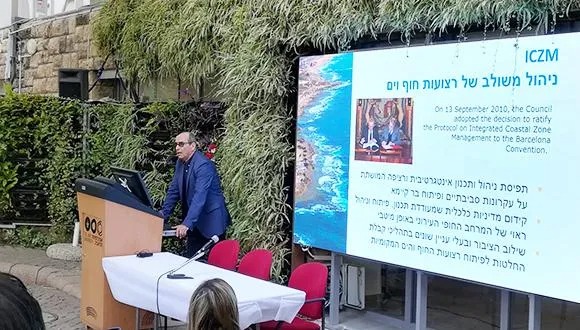
Prof. Itai Sened on the podium


